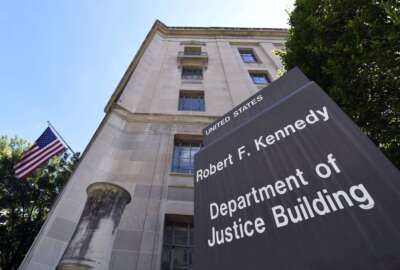Trump donates 3-month salary to National Park Service
In today's Top Federal Headlines, an audit from the Treasury Inspector General for Tax Administration says the IRS miscalculated the pay for hundreds of employe...
The Federal Headlines is a daily compilation of the stories you hear discussed on Federal Drive with Tom Temin.
In today’s Top Federal Headlines, an audit from the Treasury Inspector General for Tax Administration said the IRS miscalculated the pay for hundreds of employees.
- The president has put up some of his own money to help one agency. White House press secretary Sean Spicer announced President Trump will donate his first three months of salary to the National Park Service. During a briefing, Spicer gave a check for $78,000 to Interior Secretary Ryan Zinke. Zinke said the money will go towards repairing historic battlefields. (Department of the Interior)
- An audit from the Treasury Inspector General for Tax Administration has found the IRS has miscalculated the pay for hundreds of employees. The IRS follows a different pay system than the General Schedule when paying managers. The complexity of this system led to the incorrect payments, especially involving employees temporarily promoted during tax season to oversee seasonal employees. More than 600 employees were overpaid, totaling $4.2 million, and more than 900 were underpaid, totaling $2.7 million. TIGTA said the agency’s Human Capital Officer needs to address the over and underpayments, as well as consider simplifying the system. (Treasury Inspector General for Tax Administration)
- Sen. Jerry Moran (R-Kan.) and Tom Udall (D-N.M.) have encouraged the Trump administration to renew efforts to modernize federal IT. Moran and Udall, both members of the Appropriations Committee, wrote to White House Senior Adviser Jared Kushner, asking him to use the new Office of American Innovation to focus on improving and securing federal systems.
- A review of federal cyber standards is about to get underway. The National Institute of Standards and Technology is taking a deep dive into how agencies understand and use the special publications and Federal Information Processing Standards for cybersecurity that it produces. This congressionally-mandated review is solely a way for NIST to look at itself and improve the guidance it provides agencies. Charles Romine, director of NIST’s IT lab, said the institute will look for gaps in its techniques for providing security and identify deficiencies that NIST or other agencies find in its standards. (Federal News Radio)
- New budget documents show how the White House wants EPA to cut its budget by 31 percent in fiscal 2018. Budget cuts would force the agency to cut almost 4,000 full-time equivalents. It also asks the agency to pick a new legacy IT project from the IT dashboard to modernize within two years. The White House also wants EPA to look at its physical footprint and find office and lab space to cut or consolidate. (Federal News Radio)
- The IRS is auditing fewer tax returns. According to the agency’s 2016 data book, about 1.2 million out of 193 million returns filed in the calendar year of 2015 were examined.
IRS leadership said audit rates have been impacted by a declining budget. President Donald Trump has proposed cutting the IRS budget by $239 million. (Federal News Radio)
- President Trump names his nominee for second-in-command at the Energy Department. Dan Brouillette will serve as Deputy Secretary of Energy if confirmed. Brouillette is currently Senior Vice President and head of public policy for financial services and insurance provider USAA. Prior to that though he was Assistant Secretary of Energy for Congressional and Intergovernmental Affairs during George W. Bush’s first term. He also has some experience at the state level, serving as a member of the Louisiana State Mineral and Energy Board from 2013 to 2016.
- The Senate has passed a bill that temporarily extends the Veterans Choice Program. VA Choice was set to expire Aug. 7. Without an extension, veterans couldn’t schedule appointments past this fall. The bill lets the Veterans Affairs Department access the roughly $950 million left in the Choice Program fund. VA Secretary David Shulkin said the next step is approving a redesign of the Choice program. (Senate Veterans Affairs Committee)
- The Navy needs at least 2,000 new civilian hires to deal with its ship maintenance backlog. That number may increase if the service decides to increase the size of its fleet to 355 ships. The Navy hired 16,500 people over the past five years to repair ships. (Federal News Radio)
Copyright © 2024 Federal News Network. All rights reserved. This website is not intended for users located within the European Economic Area.
Eric White
Eric White is news anchor and Federal Drive producer at Federal News Network.
Follow @FEDERALNEWSCAST
Related Stories
Overhaul of security clearance and personnel vetting process enters new phase
Related Topics






